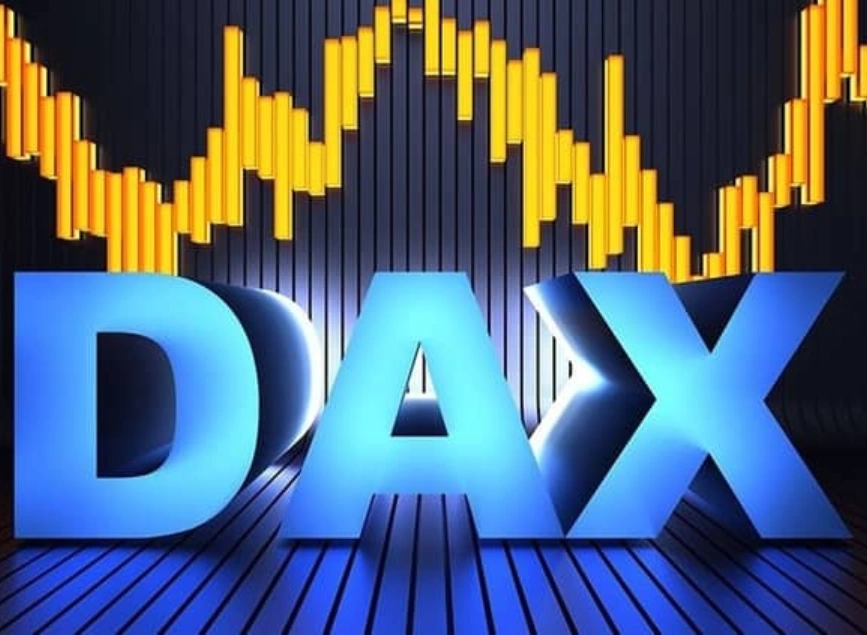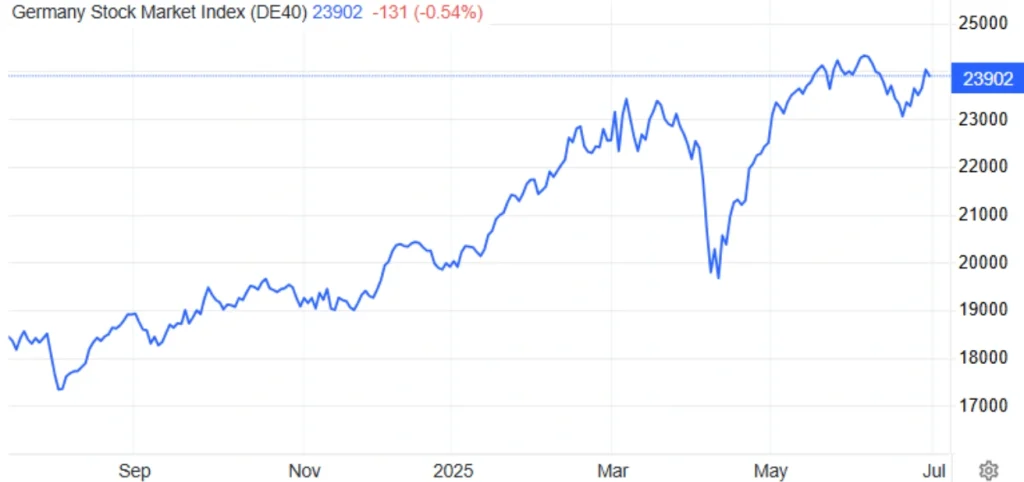
German DAX Index Drops Below 24,000 as Retail Weakens
On Monday, Germany’s benchmark DAX 40 index, also known as the German DAX Index, fell decisively below the key psychological level of 24,000, driven by disappointing economic indicators and mounting uncertainty over international trade policy.
Traders reacted to:
- ❌ Weaker-than-expected retail sales: May retail sales fell -1.6%, a sharper decline than April’s -0.6%, signaling persistent consumer weakness in Europe’s largest economy.
- ❌ Surprise inflation drop: Annual inflation unexpectedly dropped to 2.0% in June, down from 2.1% in May and below market expectations of a 2.2% uptick.
- ❌ Tariff tensions return: Former U.S. President Donald Trump announced he would not extend the current 90-day tariff pause beyond July 9, stoking new fears of trade disruption.
Key Economic Metrics
| Indicator | Latest Reading | Previous | Market Expectations |
|---|---|---|---|
| Retail Sales (May) | -1.6% MoM | -0.6% | -0.4% |
| Inflation (June) | 2.0% YoY | 2.1% | 2.2% |
| DAX Index | Below 24,000 pts | ~24,150 | No consensus |
Educational Segment: Why the DAX Matters
The DAX 40 index tracks the performance of Germany’s 40 most valuable publicly traded companies, spanning sectors such as automotive, chemicals, finance, and tech. It serves as a key barometer for the health of the eurozone economy.
Global investors often use DAX performance to gauge sentiment toward European markets, particularly during volatile periods driven by inflation shifts, trade tensions, or interest rate speculation.
Market Analysis: What’s Driving the Drop?

1️⃣ Retail Slump Signals Domestic Demand Weakness
The second straight monthly decline in retail sales highlights fragile consumer spending—a red flag for Germany’s domestic growth outlook.
2️⃣ Inflation Drop Opens Policy Doors
Lower-than-expected inflation may ease pressure on the European Central Bank (ECB), potentially allowing it to maintain or extend accommodative monetary policies in the near term.
3️⃣ Trade Policy Uncertainty Looms
Trump’s warning about tariff resumption after July 9 has rattled markets. German exporters, especially auto manufacturers and industrial giants, face growing risks if trade tensions escalate with the U.S., China, or Canada.
Market Reaction
🔻 Top Decliners:
- Deutsche Bank
- BMW
- Bayer
- Mercedes-Benz Group
- Volkswagen
- Brenntag
🔺 Gainers:
- Defense-related firms that benefit from rising geopolitical tensions
💱 Currency & Gold Implications
- The dovish inflation data could weaken the euro, especially if it diminishes expectations of rate hikes by the ECB.
- In commodities, gold may lose appeal as an inflation hedge, unless a weaker euro provides indirect support.
Final Summary and Forward Outlook
The DAX’s break below 24,000 represents both a technical breakdown and a sentiment warning. Weak consumer data and policy ambiguity are clouding the short-term outlook for German equities.
Read More: What Is Germany’s DAX Index?
Possible Scenarios
📌 Short-Term Outlook:
If trade talks with China and Canada fail to progress, German exporters may face increased pressure, likely dragging down the DAX further, especially in the industrial and auto sectors.
📌 Mid-Term Outlook:
If weak demand continues and inflation cools further, the ECB may lean into more accommodative policies, possibly providing a boost to equities through cheaper credit and liquidity support.
📍Investor Takeaway
For investors, the current mix of weak consumer spending, inflation surprises, and trade policy risk forms a volatile and dangerous cocktail. Close monitoring of ECB policy responses and global trade headlines is essential in the weeks ahead.
Share
Hot topics

Best broker for gold trading
There’s always been a certain magic about gold. Before online charts and trading applications, people stored their wealth in coins and bars, trusting that gold would retain its value during...
Read more




Submit comment
Your email address will not be published. Required fields are marked *